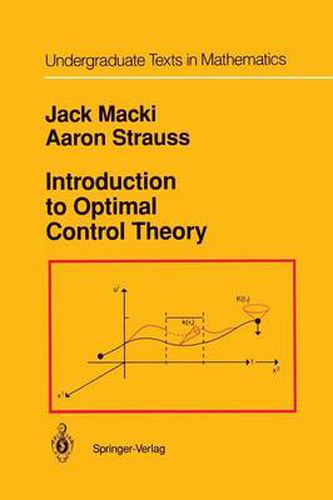Readings Newsletter
Become a Readings Member to make your shopping experience even easier.
Sign in or sign up for free!
You’re not far away from qualifying for FREE standard shipping within Australia
You’ve qualified for FREE standard shipping within Australia
The cart is loading…






This title is printed to order. This book may have been self-published. If so, we cannot guarantee the quality of the content. In the main most books will have gone through the editing process however some may not. We therefore suggest that you be aware of this before ordering this book. If in doubt check either the author or publisher’s details as we are unable to accept any returns unless they are faulty. Please contact us if you have any questions.
This monograph is an introduction to optimal control theory for systems governed by vector ordinary differential equations. It is not intended as a state-of-the-art handbook for researchers. We have tried to keep two types of reader in mind: (1) mathematicians, graduate students, and advanced undergraduates in mathematics who want a concise introduction to a field which contains nontrivial interesting applications of mathematics (for example, weak convergence, convexity, and the theory of ordinary differential equations); (2) economists, applied scientists, and engineers who want to understand some of the mathematical foundations. of optimal control theory. In general, we have emphasized motivation and explanation, avoiding the definition-axiom-theorem-proof approach. We make use of a large number of examples, especially one simple canonical example which we carry through the entire book. In proving theorems, we often just prove the simplest case, then state the more general results which can be proved. Many of the more difficult topics are discussed in the Notes sections at the end of chapters and several major proofs are in the Appendices. We feel that a solid understanding of basic facts is best attained by at first avoiding excessive generality. We have not tried to give an exhaustive list of references, preferring to refer the reader to existing books or papers with extensive bibliographies. References are given by author’s name and the year of publication, e.g., Waltman [1974].
$9.00 standard shipping within Australia
FREE standard shipping within Australia for orders over $100.00
Express & International shipping calculated at checkout
This title is printed to order. This book may have been self-published. If so, we cannot guarantee the quality of the content. In the main most books will have gone through the editing process however some may not. We therefore suggest that you be aware of this before ordering this book. If in doubt check either the author or publisher’s details as we are unable to accept any returns unless they are faulty. Please contact us if you have any questions.
This monograph is an introduction to optimal control theory for systems governed by vector ordinary differential equations. It is not intended as a state-of-the-art handbook for researchers. We have tried to keep two types of reader in mind: (1) mathematicians, graduate students, and advanced undergraduates in mathematics who want a concise introduction to a field which contains nontrivial interesting applications of mathematics (for example, weak convergence, convexity, and the theory of ordinary differential equations); (2) economists, applied scientists, and engineers who want to understand some of the mathematical foundations. of optimal control theory. In general, we have emphasized motivation and explanation, avoiding the definition-axiom-theorem-proof approach. We make use of a large number of examples, especially one simple canonical example which we carry through the entire book. In proving theorems, we often just prove the simplest case, then state the more general results which can be proved. Many of the more difficult topics are discussed in the Notes sections at the end of chapters and several major proofs are in the Appendices. We feel that a solid understanding of basic facts is best attained by at first avoiding excessive generality. We have not tried to give an exhaustive list of references, preferring to refer the reader to existing books or papers with extensive bibliographies. References are given by author’s name and the year of publication, e.g., Waltman [1974].